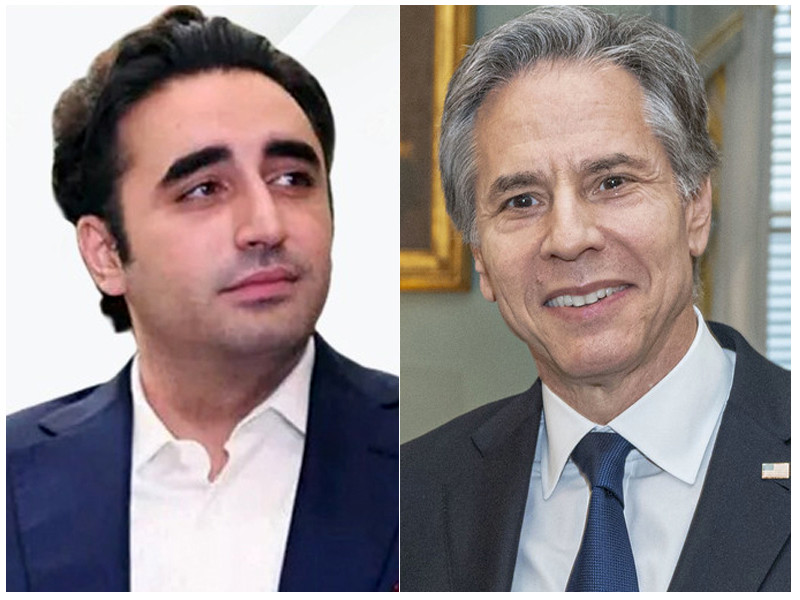M WAQAR..... "A man's ethical behavior should be based effectually on sympathy, education, and social ties; no religious basis is necessary.Man would indeed be in a poor way if he had to be restrained by fear of punishment and hope of reward after death." --Albert Einstein !!! NEWS,ARTICLES,EDITORIALS,MUSIC... Ze chi pe mayeen yum da agha pukhtunistan de.....(Liberal,Progressive,Secular World.)''Secularism is not against religion; it is the message of humanity.'' تل ده وی پثتونستآن
Sunday, May 8, 2022
#Pakistan-#US: Bringing Back Diplomacy - Antony Blinken - Foreign Minister Bilawal Bhutto
After several years of escalating US hostility towards Pakistan, a diplomatic exchange between Pakistani and US representatives has indicated signs of a warming relationship. US Secretary of State Antony Blinken called Foreign Minister Bilawal Bhutto-Zardari and invited him to a food security meeting at the UN headquarters in New York in mid-May—a first personal invitation to a UN event by the US. Both sides also discussed various aspects of the bilateral cooperation and expressed keen interest in re-engaging.
This is a different tune from what we have witnessed in the past few years, which included constant passive-aggressive statements, withdrawal of aid, and instigation of financial cases against Pakistani institutions abroad. In fact, this is the first contact between the foreign ministers of the two countries since September 2021; it speaks volumes of the nature of the relationship that there had been radio silence between the representatives for the last seven months.This positive start will no doubt fuel the Pakistan Tehreek-i-Insaf (PTI)’s allegations of a foreign conspiracy to oust the previous government. Regardless, non-hostile relations with major powers and Pakistan’s material involvement in international affairs that gravely impact us are a necessary cornerstone of good diplomacy. It is important to know how to navigate foreign relations tactfully and deal with disagreements between countries respectfully, and not take any ill-timed inappropriate actions that could unnecessarily make a political statement on the world stage.
In that respect, the new Foreign Minister is on the right path by engaging encouragingly and stressing the importance of partnership. Issues like food security affect developing countries like Pakistan gravely; a global discussion at the UN Security Council level can have material consequences on the world, and any isolation and lack of contact are detrimental to us. The engagement must continue, and we must take this forward positively.
Pakistan-US: 'Engagement with mutual respect', Bilawal tells Blinken
Foreign Minister Bilawal Bhutto-Zardari sought to strengthen a “mutually beneficial and broad-based” relationship with the United States in a maiden telephone call with his American counterpart Anthony Blinken on Friday.
Using his Twitter handle, Bilawal said he had received the telephone from Secretary Blinken, who felicitated him on his assumption of the Foreign Office.
Saying he was grateful for “warm felicitations”, the foreign minister said he had exchanged views with the US secretary on “strengthening mutually beneficial and broad-based relationship” with the United States.
The two foreign ministers also discussed the promotion of peace, development and security. “Agreed engagement with mutual respect is the way forward,” Bilawal added.
This was the first telephonic conversation between the Pakistani foreign minister and the US Secretary of State in nine months. The last time Blinken spoke to Shah Mehmood Qureshi was in August 2021 when the US-led foreign forces were withdrawing from Afghanistan.
Secretary Blinken’s telephone call to the new foreign minister came amid no let-up in former Prime Minister Imran Khan’s allegations that he was ousted from power through a US-backed conspiracy.
The coalition government led by Prime Minister Shehbaz Sharif has decided to form an “independent commission” to look into the allegations but Imran has rejected the proposal and sought a judicial commission on the matter.
The controversy revolves around a diplomatic cable the then Pakistani ambassador in Washington sent to the Foreign Office on March 7. The cable was based on Ambassador Asad Majid’s conversation with US Assistant Secretary of State for South and Central Asia Donald Lu.
In that cable, according to Imran, the US official "threatened" Pakistan of dire consequences if the vote of no confidence against the PTI leader did not succeed. The former premier claimed that he was ousted from power because he had pursued an independent foreign policy and undertook a visit to Russia despite the US opposition.
The National Security Committee (NSC), the country’s highest forum on such matters, met twice – first on March 31 when Imran was still the premier and second on April 22 when Shehbaz Sharif was the country’s chief executive. In both meetings, the NSC agreed that the language used by the American official was undiplomatic and tantamount to ‘blatant interference’ but found no evidence to suggest that there was a conspiracy against Imran Khan.
The PTI chairman, nevertheless, has kept building this narrative that the NSC has endorsed his claims. The controversy has complicated the already fraught relationship between Pakistan and the US.
The new government, however, has been trying to bring some semblance of certainty with statements underlining the importance of a relationship with the West particularly with the United States.
The US officials have also issued statements in favour of engagement with Pakistan. The latest telephone call, observers believe, suggests the eagerness from both sides to reset their troubled ties.
Despite the US pullout of Afghanistan, Washington still has stakes in the neighbouring country given that any instability would allow terrorist groups to regroup that may not just pose threat to the region but the US interests too.
Pakistan is worried over the recent spike in cross-border terrorist attacks from Afghanistan and considers counter-terrorism cooperation vital to deny the banned Tehreek-e-Taliban Pakistan (TTP) and other groups space in Afghanistan.
https://tribune.com.pk/story/2355437/engagement-with-mutual-respect-bilawal-tells-blinken
